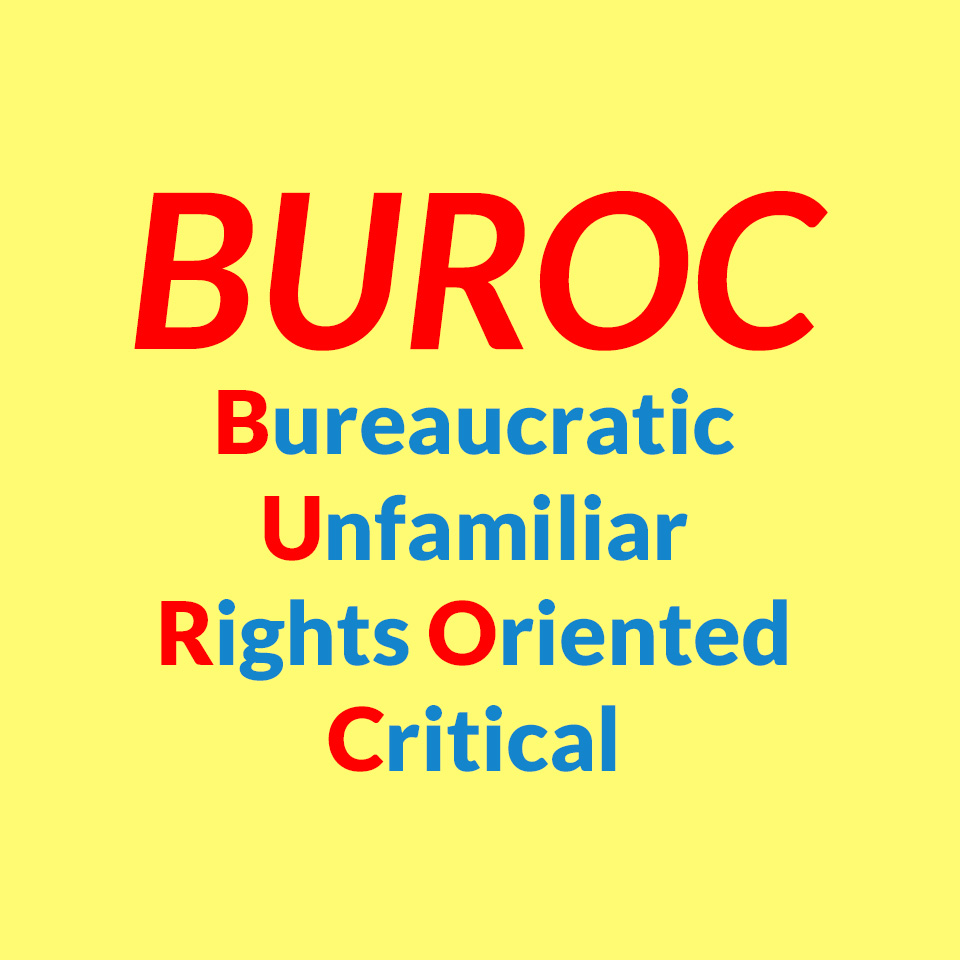I used to speak of plain language in terms of it being “the right thing to do” and also the most effective thing to do from a utilitarian perspective (i.e., it gets results). But then I came across Russell Willerton’s book Plain Language and Ethical Action: A Dialogic Approach to Technical Content in the 21st Century, which completely changed the way I approach teaching plain language.
Willerton examines the different ways academics and technical writers approach the topic of plain language. He makes a passionate argument for looking at it from the angle of ethics. The core of Willerton’s book is a framework for determining when using plain language becomes an ethical imperative as opposed to simply a good thing to do. (For an actual book review, see our own Iva Cheung’s blog.)
In government, the word ethics is powerful, as are frameworks. So, I leverage the materials in this book at every level of my plain language teaching. Perhaps you, too, will find it useful.
The BUROC framework for plain language
Willerton calls his framework the BUROC framework. If your writing falls under any of the following categories, you should consider it an ethical responsibility to use plain language.
- B is for bureaucratic. Bureaucratic situations tend to be complex, involving layers of interdependent policies and procedures (making an insurance claim, for example).
- U is for unfamiliar. Unfamiliar situations may require people to use jargon they’ve never heard before or a language that’s not their native one (consider someone reading a mobile-phone contract in their second language).
- R and O are for rights oriented. These situations affect people’s choices to act within their rights (instructing citizens how to vote is a good example).
- C is for critical. These are important situations that may arise without warning and have significant consequences (think of health-care scenarios).
The category that authors overlook most often is unfamiliar. I believe this is because highly professional environments are not always the most representative of the people they need to communicate with. A certain amount of language privilege sneaks in. You don’t know what you don’t know. So, here are some national statistics to chew on.
Literacy
Canada is one of the 36 member nations of the Organisation for Economic Co-operation and Development (OECD). It developed a standardized measure called the Programme for the International Assessment of Adult Competencies (PIAAC), used to measure important statistics around the world, including literacy. Here are some key literacy findings for Canadians aged 25–65 as of 2012.
- Nearly half demonstrated low literacy (49%), low numeracy (55%), or both (43%) — low meaning proficiency level 2 or under out of 5.
- That number increased to 65% for off-reserve First Nations and Métis adults.
- 27% of university graduates — that is, 1 in 4 — demonstrated low literacy. Think of that next time you tell yourself your document is “just for other economists/engineers/etc.”
Being in provincial government, I like to follow up with some local stats, easily obtained from the national census (2016 data). Here are the Alberta stats I tend to use:
- English is a foreign language for 1 in 4 Albertans.
- For 13% of Albertans, English is not the primary language spoken at home.
- 17% of Albertans aged 25–64 do not have a high school diploma.
- 28% of Albertans aged 25–64 have only a high school diploma.
- That means that almost half of Albertans aged 25–64 have no post-secondary education.
Whether or not you work for government, I see editors as “public servants.” Hopefully the BUROC framework and these literacy statistics will help you in that rewarding (if Sisyphean ) role.
___
Previous post from Aaron Dalton: Empirical Editors: Acronyms.
Editors’ Weekly is the official blog of Editors Canada. Contact us.
Discover more from The Editors' Weekly
Subscribe to get the latest posts sent to your email.
